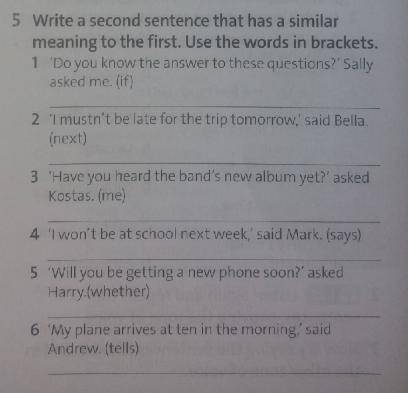Write a second sentence that has a similar meaning to the first. Use the words in brackets. 1)"Do you know the answer to these questions?" Sally asked me. (if)
2)"I mustn`t be late for the trip tomorrow," said Bella. (next)
3)"Have you heard the band`s new album yet?" asked Kostas. (me)
4)"I won`t be at school next week," said Mark. (says)
5)"Will you be getting a new phone soon?" asked Harry. (whether)
6)"My plane arrives at ten in the morning," said Andrew. (tells)

Другие вопросы по теме Английский язык
Популярные вопросы
- Сколько на рисунке животных? (7) сколько из них диких? (6) сколько ? (1) запиши...
1 - Сколько километров проедет автомобиль за 300м двигаясь со с коростью 75км/ч...
1 - Напишите отзыв на рассказ чехова тоска...
1 - Вклад арабов в развитие науки и культуры...
2 - Миша дошел до маши за 10 мин.бежавше со скоростью 250 м\мин.обратный путь он за...
2 - Составьте 2 разных предложения со словосочетаниями сильный ветер , холодный взгляд...
1 - Тамақ,той сөздерінің омонимдік мағыналарын ашатындай сөйлем құраңдар...
1 - Заповни пропуски : can you pass me a of tea, please? here .thank you. cake? yes,...
1 - Вкакой строке пример пищевой цепи озера 1)комар лягушка цапля2)тимофеемка полевка...
3 - Подберите антоним к слову волшебная и синоним к слову внутренняя....
1
To rewrite this sentence, we can start with the statement "Sally asked me" and then use the word "if" to introduce the question. We also need to change the verb "know" to its past form "knew" to match the context of the sentence.
2. Bella said that she mustn't be late for the trip tomorrow.
To rephrase this sentence, we can start with the statement "Bella said" and then use the word "that" to introduce the reported speech. We also need to change the verb "mustn't" to its past form "mustn't be" to match the context of the sentence.
3. Kostas asked me if I had heard the band's new album yet.
To rewrite this sentence, we can start with the statement "Kostas asked me" and then use the word "if" to introduce the question. We also need to change the verb "have" to its past form "had" to match the context of the sentence.
4. Mark says that he won't be at school next week.
To rephrase this sentence, we can start with the statement "Mark says" and then use the word "that" to introduce the reported speech. We also need to change the verb "won't be" to its past form "won't be" to match the context of the sentence.
5. Harry asked whether I would be getting a new phone soon.
To rewrite this sentence, we can start with the statement "Harry asked" and then use the word "whether" to introduce the question. We also need to change the verb "will be getting" to its future form "would be getting" to match the context of the sentence.
6. Andrew tells that his plane arrives at ten in the morning.
To rephrase this sentence, we can start with the statement "Andrew tells" and then use the word "that" to introduce the reported speech. We also need to change the verb "arrives" to its past form "arrives" to match the context of the sentence.